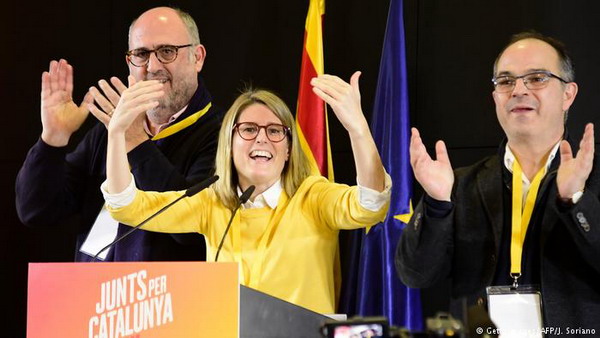Deutsche Welle. Ousted regional President Carles Puigdemont is set to regain power in Catalonia after his Together for Catalonia (Junts per Catalonia) party captured 34 seats in Thursday’s election. Together with the 36 seats of the two other pro-independence parties, the separatists are headed for an absolute majority in the 135-seat regional parliament.
Puigdemont’s bloc had fared slightly better in the last regional elections in 2015, however, when the pro-independence parties earned 72 seats.
The secessionist parties garnered only 48 percent of the popular vote. The pro-Madrid Citizens party won the most seats outright with 37, but will not be able to form as substantial a coalition as the secessionists.
Speaking from exile in Brussels, Puigdemont called the election a victory for the “Catalan Republic” as well as a “slap in the face” to Spanish Prime Minister Mariano Rajoy.
“I think we have earned the right to be listened to,” he added.
Citizens’ leader Ines Arrimadas said the result shows that “the majority of Catalans feels Catalan, Spanish and European,” and vowed to fight the pro-independence parties in the region.
Catalan National Assembly Vice President Agusti Alcoberro claimed victory on behalf of the separatists, declaring in front of a crowd in Barcelona that “pro-independence forces have won the elections.”
Alcoberro then demanded the release of imprisoned secessionist politicians and “the restitution of the government,” sacked by Madrid.
The regional election was largely seen as a mandate on the highly autonomous Spanish region’s push for independence from Spain. Lead-up polling had favored two contenders, the ERC on the pro-independence side and Citizens on the pro-union side, in a tight race for the largest share of seats.
Exiled Puigdemont offers to meet Rajoy
The pro-independence forces garnering an absolute majority could be a significant blow to the government of Prime Minister Rajoy, who had hoped the election would put an end to the drive to secede. It will also do little to end the political deadlock, with a minority of voting Catalans supporting secession but a pro-secessionist government taking the regional reigns of government.
The vote on Thursday had been ordered by Rajoy in the aftermath of a highly contested independence referendum on October 1 and a subsequent unilateral declaration of independence, both of which were ruled unconstitutional. The central government in Madrid also sacked Puigdemont’s regional government and took direct control of the region.
During his victory speech from Brussels on Friday, Puigemont offered to meet with Rajoy outside of Spain to discuss Catalonia’s independence crisis, adding that it was time to repair the damage done by Madrid’s decision to take direct control of the region.
The Catalan leader also said that he was willing to return to Barcelona provided he was guaranteed to be able to take his position as the head of the new regional government.
Germany calls on Catalan government to respect Spanish constitution
Germany was the first EU ally to weigh in on the Catalan vote on Friday, saying that the region’s future remained a Spanish domestic issue that “has to be resolved within Spanish law and the Spanish constitutional order.”
During a government news conference in Berlin, spokeswoman Ulrike Demmer told reporters: “We hope that the current division in Catalan society can be overcome and that a common future can be found with all political forces in Spain.”
More – see Deutsche Welle
Photo – Deutsche Welle
























































